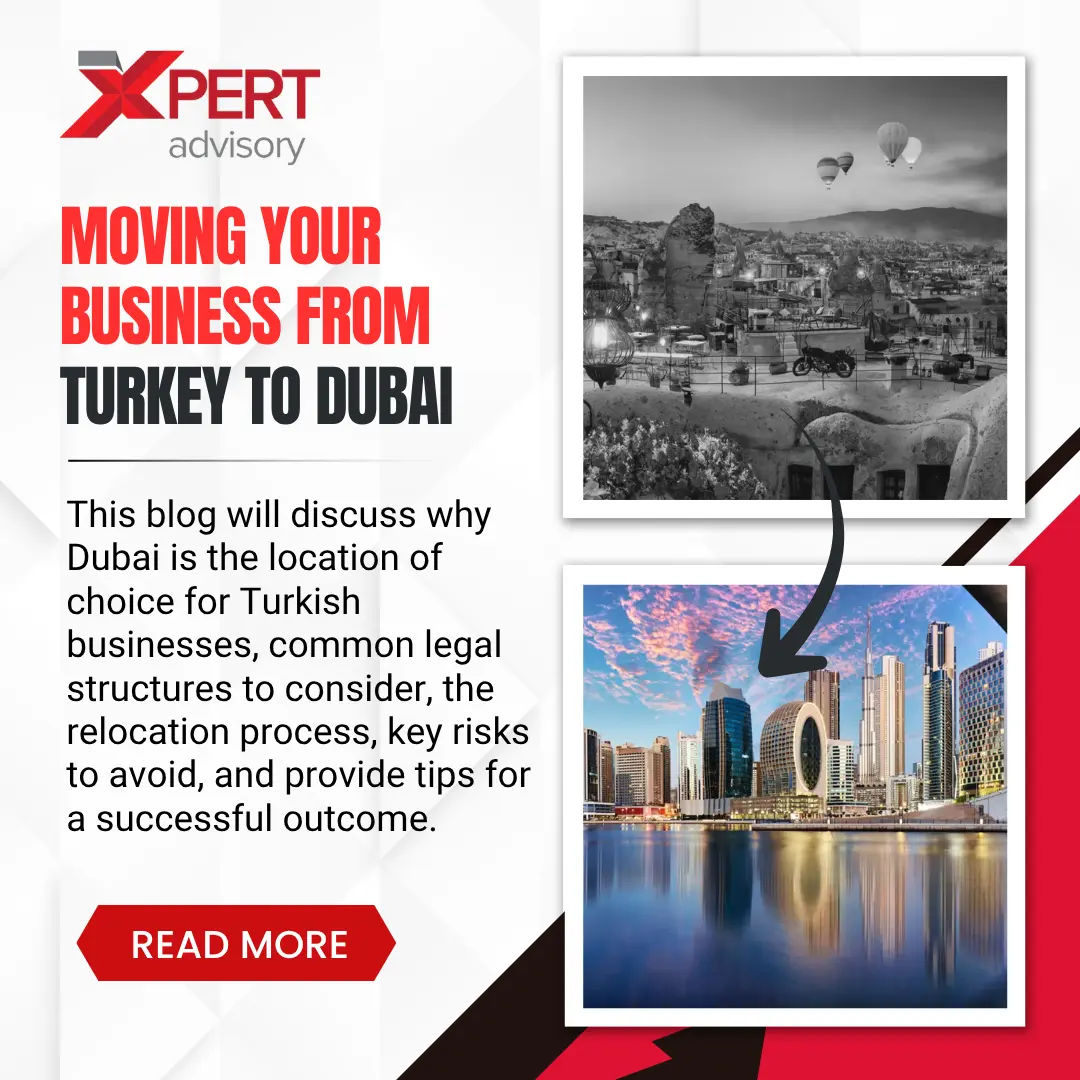In recent years, many Dutch entrepreneurs and companies have explored the possibility of relocating their businesses from the Netherlands to Dubai, attracted by life in the UAE. And it’s not hard to see why: Dubai offers tax efficiency, global connectivity, and a welcoming environment for foreign investors. It’s important to clarify that relocation is not simply a move to a new market – it is about positioning your company in a strategic hub that connects Europe, Asia and Africa.
This blog will explore why Dubai is such an appealing destination, the legal considerations you must understand, the step-by-step process of company registration, the risks involved and how to mitigate those. Without any further ado, let us understand the process of moving your business from Netherlands to Dubai:
Why Should You Move Your Business Venture from the Netherlands to Dubai?
Moving a business setup is a big decision and it is important to understand what the advantages will be when relocating your business to Dubai. The appeal of the Venice of the Gulf is the combination of being in a strategic geographic position, a favourable tax regime, and a flexible ownership structure. Let us dive into the many reasons why moving your business to Dubai is a smart move to make;
Strategic Geographic Position and Infrastructure
Dubai has the reputation of being a “gateway city” between the East and the West. The quality of its airports, ports, and other logistical supports makes it a prime company location if you are interested in accessing the Middle East, Asia, and Africa while also still having access to Europe. This is a major benefit for Dutch companies that are engaged in cross-border trade while living in the UAE.
Tax Registration and Financial Incentives
One of the most attractive pull factors is Dubai’s favourable tax position. The UAE corporate tax is 0% on profits up to AED 375,000*, and the tax rate thereafter is 9%. For context, corporate tax in the Netherlands is much higher.
If you set up businesses in Dubai’s various free zones, the incentives are even better. These zones often come with a full corporate tax rate and personal income tax exemptions, no customs duties, and free return of profits.
100% Foreign Ownership & Legal Simplification
In mainland Dubai, foreign investors have historically had to work with a local partner who holds at least 51% of the company’s shares. This requirement has been removed for many sectors, so Dutch entrepreneurs now enjoy 100% foreign ownership of mainland companies in many industries, in addition to full ownership benefits that are already available in free zones.
This change greatly simplifies the legal situation and puts Dubai ahead of almost all other jurisdictions in the region for expatriates and foreign investors.
Netherlands–UAE Tax Treaty
There is a double taxation treaty between the Netherlands and the UAE. This means that Dutch companies expanding or relocating to Dubai need not be taxed twice on the same income, establishing a sound financial basis for moving. Furthermore, the treaty provides additional comfort for entrepreneurs to move to Dubai.
Types of Business Jurisdictions in Dubai
Types of business jurisdictions in Dubai include options for free zone companies and mainland businesses. Dubai offers three main types of business jurisdictions, and it is important to select the right one because it determines your operations and compliance obligations.
Abu Dhabi Company Setup
A Dubai and Abu Dhabi company is registered with the Dubai Department of Economy and Tourism (DED) and allows a business to trade anywhere in the UAE. Once approved, mainland businesses can operate in the local market – no restriction on what goods and/or services can be sold directly. As a result of the new ownership reforms, foreign entrepreneurs can also fully own their local businesses (most sectors) and require no local sponsor.
Services Provided by the UAE Freezone Company Setup
// Modify Heading and make it gramatically correct. (Done)
Free zones are deliberately designed to attract international businesses with relaxed regulations, features, and tax benefits. Owners of free-zone companies receive, among others, the following privileges:
- 100% foreign ownership
- Full profit repatriation
- Residency Visa
- Emirates ID
- Exemption from import/export duties
The limitation is that free-zone companies cannot direct trade with the UAE mainland without a distributor.
Notable Freezones
DMCC (Dubai Multi Commodities Centre): DMCC is recognized as one of the fastest and most efficient methods for conducting business. Furthermore, DMCC is globally recognised and is also one of the biggest free zones in Dubai with a distance of established business options.
JAFZA (Jebel Ali Free-zone): JAFZA is a logistics dynamique that traditionally connects to, and feeds off, one of the biggest and best ports in the world of logistics.
DAFZ (Dubai Airport Free-zone: DAFZ is ideal for businesses that require air freight, as it grants full foreign ownership, full duty-free trade.
Dubai Internet City: Ideal for technology and digital enterprises, with long-term tax and customs exemptions.
Step-By-Step Process To Relocate Your Company
Although moving to the UAE may appear complex, with the right advice on setting up your business, the process can be quite simple.
1. Clearly Define Business Activity & Structure
First, define your business activity and legal structure for starting a company in the UAE. Establishing a business in a free zone, offshore, or in a business landscape will dictate compliance with licensing rules and regulations.
2. Reserve Trade Name & Obtain Initial Approval
Next, reserve your trade name with the appropriate authority for your UAE Visa. Remember, Dubai has very strict naming conventions, so ensure your proposed name meets the protocols. You will receive an approval certificate once cleared!
3. Setting up a Business in Dubai
Apply through the Department of Economic Development or an appropriate free zone authority for the trade license to facilitate the setup process. Once approved, the trade license will be the legal basis for your business in Dubai.
4. Obtain Office Space
Obtain Office Space in a free zone to maximize benefits for your business in the UAE. Physical office space is essential for emirate operations. A free zone will often have a flexi-desk or a virtual office option, which will save you costs for startups or small businesses.
5. Open Corporate Bank Account
A UAE corporate bank account is essential for your company formation. You will need the proper documentation and allow time for this process, but with the proper professionals supporting you, opening a bank account becomes much easier.
6. Apply For Visas
Expats often find Dubai an attractive place for business opportunities. As a business owner, an investor visa application is an option. An investor visa allows you to also sponsor visas for your family and staff members. The work visa quota depends on your office size and company type.
7. Register For Tax & Compliance Requirements
For companies reaching the threshold of AED 375,000* of annual revenue, you must register for VAT. You may have additional compliance depending on your business activity such as Economic Substance Regulations (ESR).
8. Ongoing Compliance & Renewal
Licenses, visas and permits are required annually to renew. You must ensure you renew your residency visa on time and remain compliant. Non-compliance or delays could lead to penalties and/or stop trading as a company in the UAE.
Risks And Common Mistakes
Business relocation can present difficulties, but being aware can ultimately save you precious time and money.
Legal & Structural Misalignment
Many entrepreneurs make the mistake of selecting a free zone without understanding the implications. If you are looking to trade directly in the UAE market, a Dubai mainland license is required.
Tax Residency Definitions and Dutch Obligations
The UAE has very favourable tax regulations for most overseas investors. However, Dutch entrepreneurs must clearly establish their tax residency in Dubai. Tax residency will be defined after spending the required 183 days in the UAE, meaning that you must spend more than 183 days in the United Arab Emirates each calendar year to be recognised as a tax resident.
Failing to deregister in the Netherlands may mean that the Dutch tax authority will continue to see you as a tax resident and target any taxes due for in the Netherlands.
Compliance Oversights and Administrative Responsibilities
Failing to renew your license, or file regulatory documents can lead to penalties. Many companies want to avoid the time penalty, and often partner with values-based advisory firms such as Xpert Advisory to manage time-sensitive compliance processes.
Advice From Entrepreneurs (Infactual Insights)
Entrepreneurs who have moved from Europe to Dubai impart real-world advice:
- “Setup experts can help with certain things such as banking and licensing to allow you a smoother start in your business setup in Dubai.”
- “There’s definitely a shift period in going from the authorities in the Netherlands to establishing a company in Dubai, but the workflow does remain.”
These tips remind everyone how valuable it is to have professional assistance when relocating.
Final Thoughts & Key Takeaways
Relocating your company from the Netherlands to Dubai allows for greater international opportunities, having a more tax-efficient company, and advancing business possibilities! There are so many details, from picking a strategic location like Dubai and a business structure to be compliant with both Dutch and UAE regulations, which require a lot of planning.
Ready to Move Your Business from the Netherlands to Dubai?
Let Xpert Advisory take away the burden of moving to Dubai and setting up your business in Dubai. From legal documents, licensing, and compliance, Xpert Advisory consultants in Dubai will manage the details of your transition, allowing you time to expand your business. Make moving from a bundle of stress to a strategic decision. Contact us today!
FAQs
1. Can I Still Have my Dutch Company and Trade from Dubai?
Yes, many businesses keep their Dutch entity active while opening a branch or subsidiary or a sometimes a partnership in Dubai. Keeping your Dutch entity active with a branch or subsidiary offers flexibility, while also having the need for comprehensive tax planning.
2. How Long Does Relocation Take?
The business set up process in Dubai can take as little as one to two weeks from licence application to approval. Then it’s a matter of time to sort out the visa process and any bank account in the UAE that may be required.
3. Will I Have to Pay Corporate Tax in Dubai?
Profits below AED 375,000* pay 0%, profits above AED 375,000* incur a 9% tax. Many free zones also provide a complete exemption.
4. I am Moving will I Lose my Tax Residency?
To be accepted as a tax resident in the UAE you must spend a minimum of 183 days in the country and de-register in the Netherlands. Always speak to your tax adviser for a clear position.






